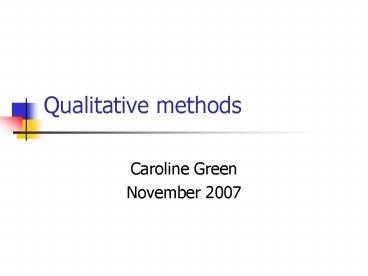Qualitative methods - PowerPoint PPT Presentation
1 / 26
Title:
Qualitative methods
Description:
... (1996) Handbook of Qualitative Research Methods for Psychology and the Social Sciences. ... (2006) Introduction to Research Methods and Statistics in ... – PowerPoint PPT presentation
Number of Views:189
Avg rating:3.0/5.0
Title: Qualitative methods
1
Qualitative methods
- Caroline Green
- November 2007
2
Quantitative and qualitative data
- What are the differences?
- Quantitative numerical data
- Qualitative - non-numerical data
3
Qualitative data
- Non-numerical data, mostly in the form of
meanings - what people say
- pictorial e.g. graffiti
- content of stories, songs,myths
- uncategorized, unedited recordings of
behaviour
4
Qualitative approaches
- Protocol analysis (Ericcson and Simon
(1980,1983,1993)) - Grounded theory (Glaser and Strauss(1967),
Strauss and Corbin(1990)) - Action research (Lewin(1946))
- Ethnography
- Feminist research
- Discourse analysis
5
Protocol Analysis
- Verbal protocols recordings of what people say
when carrying out a task under instructions to
verbalise all thoughts. - Used most in problem solving tasks to provide
extra information about strategies etc
6
Grounded theory
- Advocates research with no prior commitment to
expectations. - Theory emerges from repeated sampling of
qualitative data from local circumstances in
their social context
7
Action Research
- Used when social change envisaged social change
effected consequent changes observed. - Tied to applied work context is participative
8
Ethnography
- Used more in anthropology sociology
- Concentrates on field research of and within the
lifestyle of the social group of interest. - Strongly associated with intensive participant
observation
9
Feminist research
- Exposure of male bias in theory and research
- Aims at ultimately, a world free of male, or
perhaps any oppression. - Research tends to be action oriented with
interventions aimed at some measure of increased
awareness
10
Discourse analysis
- Discourse constructs our social world
- Looks at what people do with their talk and the
social actions performed with speech
11
Positions in the qualitative-quantitative debate
- No qualitative data
- Qualitative data convert to quantitative data
- Qualitative data can support quantitative
findings - Qualitative and quantitative methods equal but
different - Quantitative methods only
12
Contrasting principles of the 2 approaches
- Hypothetico-deductive method
- vs
- Inductive analysis
13
Contrasting principles of the 2 approaches
- Reductionism
- vs
- Holism
14
Contrasting principles of the 2 approaches
- Positivism
- vs
- Constructivism relativism
15
Contrasting principles of the 2 approaches
- Knowledge facts gained from the world
- Vs
- Knowledge social construction
16
Contrasting principles of the 2 approaches
- Significance testing
- Vs
- Data gathering and analysis not separated
17
Contrasting principles of the 2 approaches
- Research on subjects population sample
- Vs
- Research with participants
18
Contrasting principles of the 2 approaches
- Structure and control elimination of extraneous
variables - Vs
- Flexibility look for all possible contributory
information
19
Contrasting principles of the 2 approaches
- Numbers
- vs
- Human meanings in social contexts
20
Contrasting principles of the 2 approaches
- Laboratory or controlled environment
- vs
- Naturalistic
21
Contrasting principles of the 2 approaches
- Reliability tests
- vs
- Reliability no overall qualitative agreement
22
Contrasting principles of the 2 approaches
- Validity tests
- vs
- Validity set of criteria
23
Criteria for achieving validity in qualitative
research
- Trustworthiness and genuineness
- Triangulation
- Respondent validation
- Peer agreement
- Independent audit
- Internal coherence
- Reflexivity
24
Practical issues in qualitative research
- Can be very time consuming to conduct
- Can take more of participants time compared to
an experimental approach - Analysis can be resource intensive
25
Bibliography
- Richardson, J.T.E. (Ed).(1996) Handbook of
Qualitative Research Methods for Psychology and
the Social Sciences. Leicester BPS Books - McQueen, R. and Knussen, C. (2006) Introduction
to Research Methods and Statistics in Psychology.
Harlow Prentice Hall. Chapter 12. - Eysenck, M. (Ed.) (1998). Psychology an
integrated approach. Harlow Addison Wesley
Longman. Chapter 21.
26
Web reference
- http//jan.ucc.nau.edu/mid/edr725/class/index.htm
l

